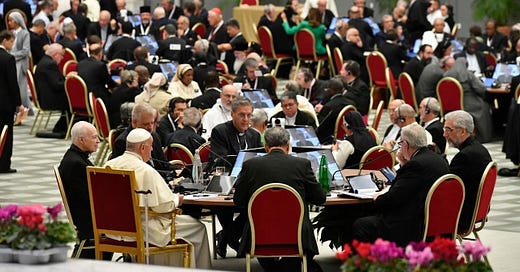Last weekend, I went into overdrive to finish up my “world tour” in preparation for the Synod on Synodality and to prepare a guide bringing together all of the articles in the series. The series took a huge amount of effort, but it paid off for me personally because it greatly enriched my understanding of the global Church and the issues facing it, while also introducing me to a host of Catholics from around the world living out the faith in inspiring ways. I hope the series has been rewarding for you as readers, as well.
Although I could have used a break after completing that massive task, instead, this past week has been one of the most eventful for the Catholic world in quite some time. Three events, in particular, were of particular importance:
A New Dubia Letter, and Pope Francis’s Response: On Monday, a group of five cardinals, including the American Raymond Burke, made public a letter including five dubia, or doubts, on the following controverted topics: the development of doctrine; the blessing of same-sex unions; synodality; the ordination of women to the priesthood; and sacramental absolution. The letter had in fact been submitted to Pope Francis in July; not satisfied with the pope’s answers—they claimed Francis’s responses “have not resolved the doubts we had raised, but have, if anything, deepened them”—the cardinals submitted a second letter in August, making it public this week. Unexpectedly, later on Monday the Vatican released to the public Francis’s responses from July. Perhaps most notably, Francis expressed an openness to blessing persons in same-sex relationships.
Laudate Deum: On Wednesday, October 4, the Feast of St. Francis and the day on which the Synod opened, the Vatican released Pope Francis’s apostolic exhortation Laudate Deum, a follow-up to his 2015 encyclical Laudato Si’ lamenting the lack of progress in combatting climate change.
The Synod Opens: After an ecumenical prayer vigil led by the Taizé community on September 30 and three days of retreat for the Synod participants, led by Timothy Radcliffe, O.P. and Mother Maria Ignazia Angelini, O.S.B., on October 1-3, the Synod on Synodality opened on the evening of October 4 and began in earnest the following day.
I have been asked to write an essay on Laudate Deum for the Political Theology Network, which I will cross-post in the newsletter next week, so I won’t comment on it now. But I did want to offer some comments on the dubia letter and Francis’s response, especially on same-sex blessings, as well as on reporting on the first days of the Synod.

The New Dubia Letter and Same-Sex Blessings
As I noted last week, skeptics of the synodal process have expressed fears that the Synod has been pushed as a means of changing Church teaching on issues like same-sex relationships and the ordination of women. Despite assurances that the Synod had no agenda and was not primarily focused on those issues, the fears of the skeptics have been strengthened by synod organizers like Cardinal Jean-Claude Hollerich, S.J., and a number of European bishops participating in the Synod, who have made statements suggesting those very issues should be re-examined. The release of the new dubia letter right as the Synod was beginning suggests that the cardinals’ intent was to force the issue, to in essence make the Synod about the very issues the skeptics fear it will be about: a kind of ecclesiastical “heightening of the contradictions.”
I agree with John Allen, however, that the stunt may end up having the opposite effect, since it allowed Pope Francis to preemptively address the issues at stake, freeing the Synod participants to address other matters:
One could argue that by providing his answers on these matters now, Francis effectively has prevented synod discussions from being hijacked by controversy. Presumably, should someone now inside the synod want to begin banging the drum either for or against the blessing of same-sex unions, or the ordination of women, the almost reflexive response will be, “Come on, guys, the pope’s already spoken, so let’s move on.”
Allen may have a point; the opening of the Synod seems to have overshadowed the publication of the dubia, and even Pope Francis’s noteworthy response to it.
At the same time, looking at the content of Pope Francis’s responses, Colleen Dulle, writing at America, notes that they might have a deep impact on the Synod’s proceedings, rejecting the “yes or no” mentality of the dubia and instead proposing “yes, and” answers that somehow reconcile seemingly conflicting perspectives. Dulle claims that this reflects the synodal style Francis is advocating and that involves listening to all sides while finding common ground.
Keep reading with a 7-day free trial
Subscribe to Window Light to keep reading this post and get 7 days of free access to the full post archives.




